Unit 1 How can we become good learners?Section B 1a-1d 课件 (共37张PPT,含内嵌音视频) 人教版九年级全册
文档属性
| 名称 | Unit 1 How can we become good learners?Section B 1a-1d 课件 (共37张PPT,含内嵌音视频) 人教版九年级全册 |

|
|
| 格式 | pptx | ||
| 文件大小 | 67.6MB | ||
| 资源类型 | 教案 | ||
| 版本资源 | 人教新目标(Go for it)版 | ||
| 科目 | 英语 | ||
| 更新时间 | 2024-07-23 00:00:00 | ||
图片预览


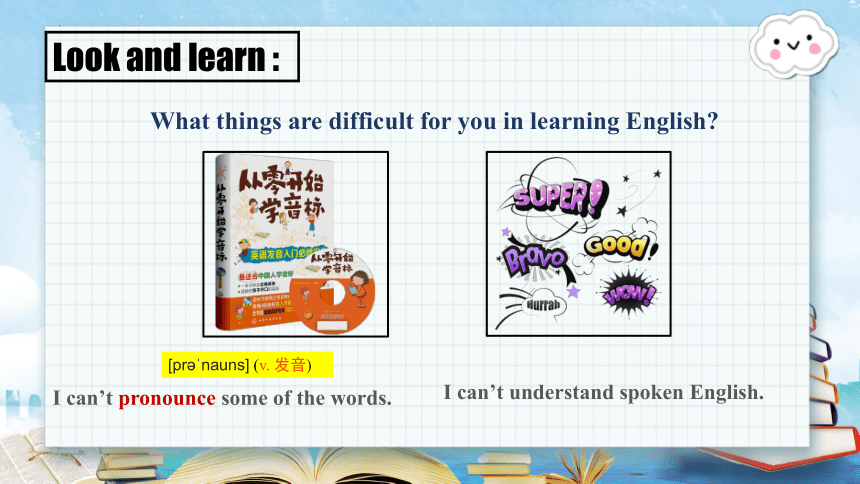
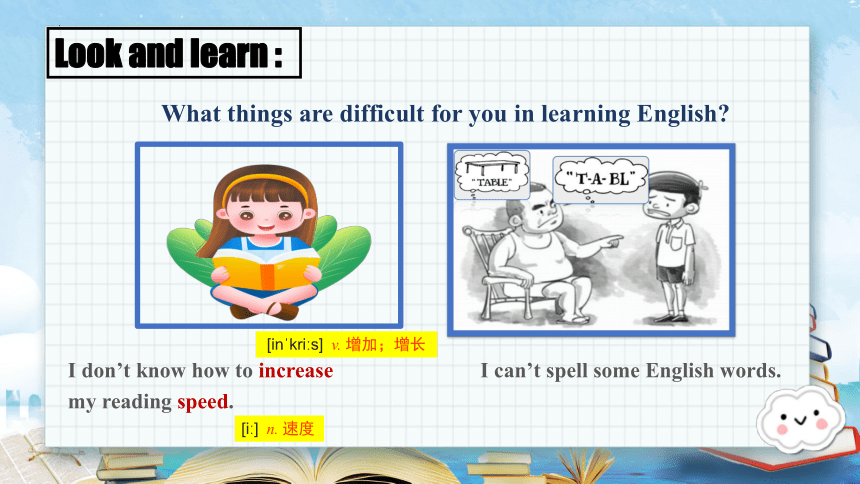

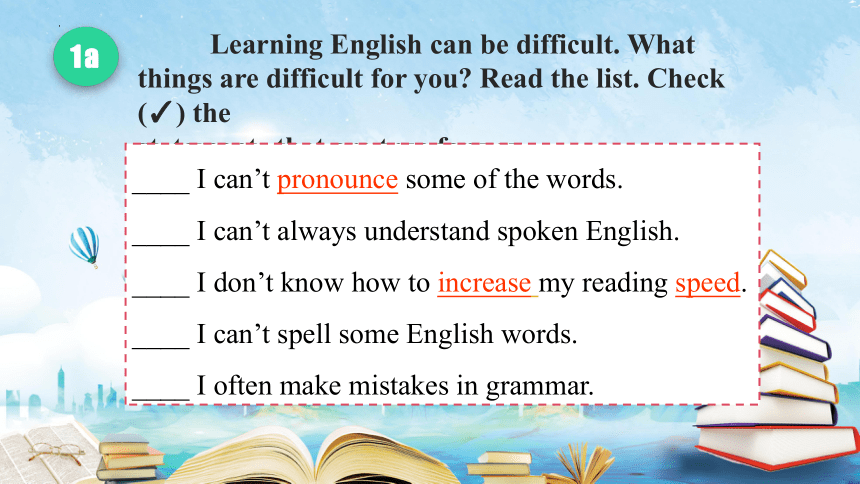
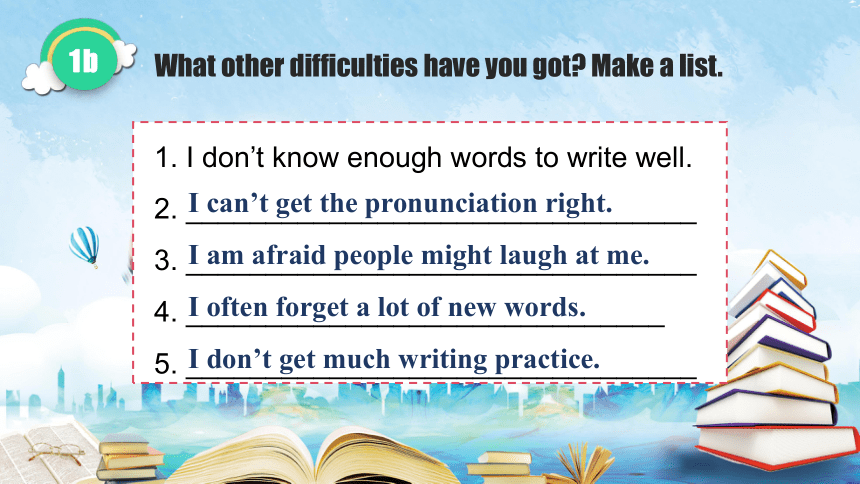
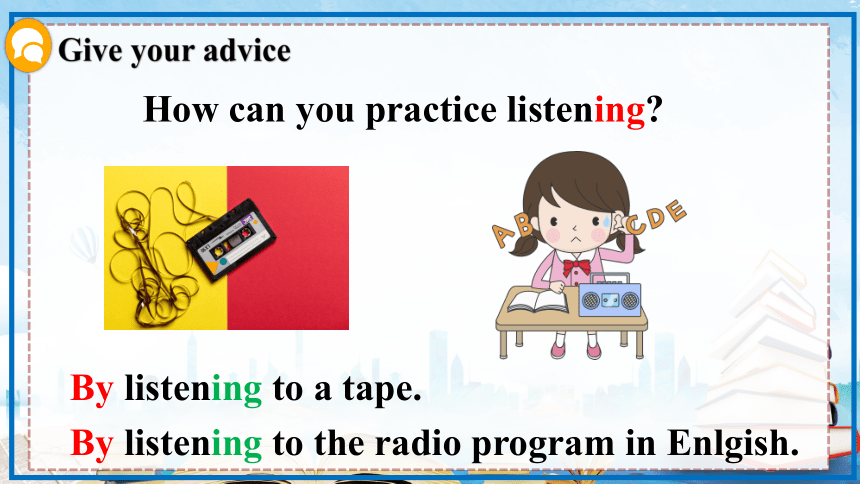
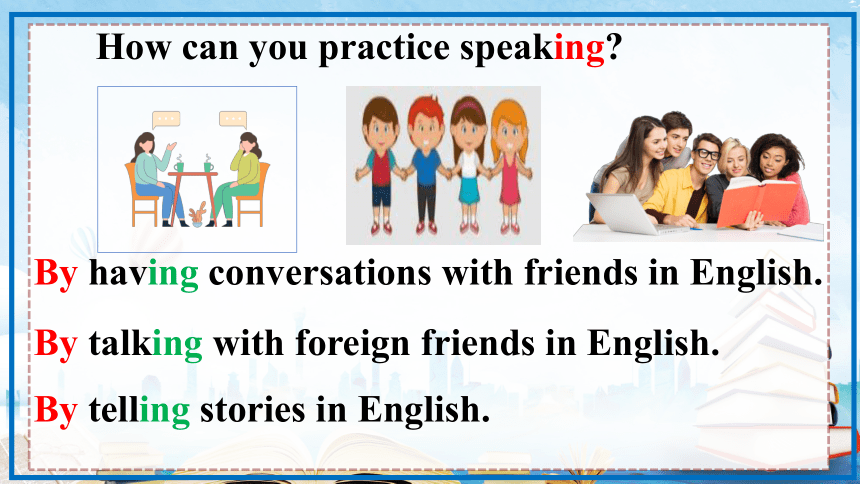

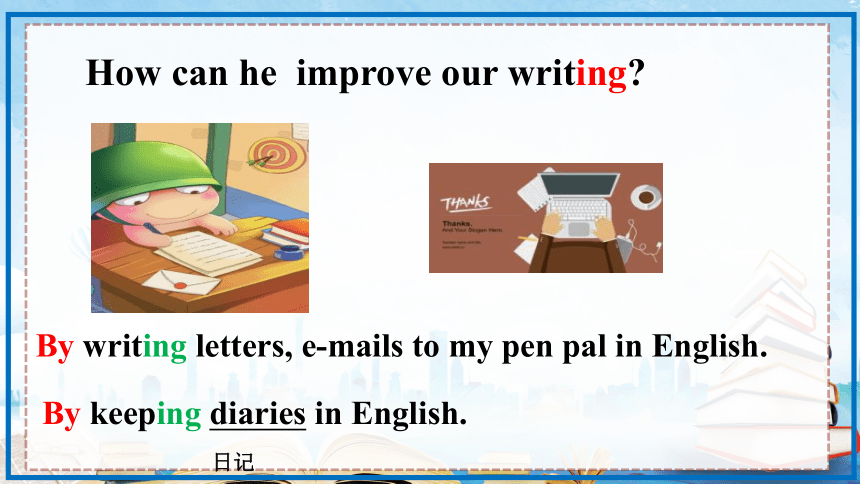
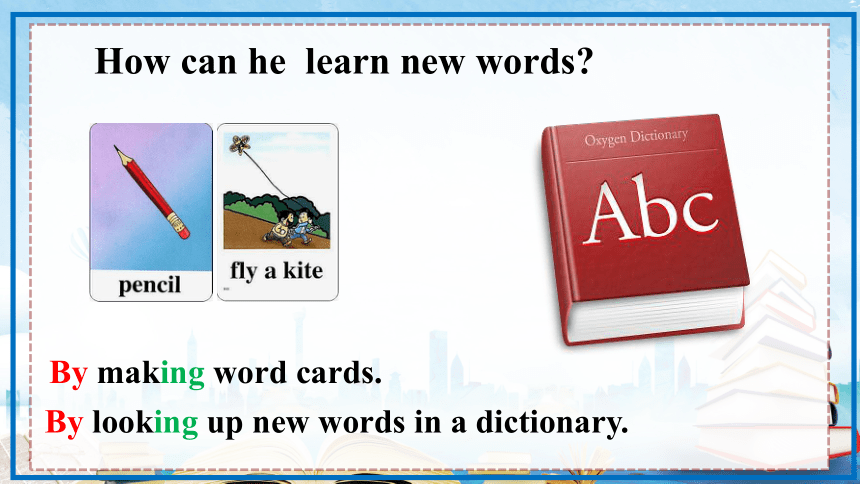
文档简介
(共37张PPT)
Section B 1a-1d
Unit1
How can we become a good learners?
Watch and discuss:
What’s the big problem the girls face
What makes it difficult for you to learn English
What things are difficult for you in learning English
Look and learn :
I can’t pronounce some of the words.
I can’t understand spoken English.
[pr nauns] (v. 发音)
I don’t know how to increase
my reading speed.
I can’t spell some English words.
What things are difficult for you in learning English
[in kri s] v. 增加;增长
[i ] n. 速度
Look and learn :
I often make mistakes in grammar.
I don’t know enough words to write well.
What things are difficult for you in learning English
Look and learn :
Learning English can be difficult. What things are difficult for you Read the list. Check ( ) the
statements that are true for you.
____ I can’t pronounce some of the words.
____ I can’t always understand spoken English.
____ I don’t know how to increase my reading speed.
____ I can’t spell some English words.
____ I often make mistakes in grammar.
1a
What other difficulties have you got Make a list.
1b
1. I don’t know enough words to write well.
2. ________________________________
3. ________________________________
4. ______________________________
5. ________________________________
I can’t get the pronunciation right.
I am afraid people might laugh at me.
I often forget a lot of new words.
I don’t get much writing practice.
How can you practice listening
By listening to a tape.
By listening to the radio program in Enlgish.
Give your advice
How can you practice speaking
By having conversations with friends in English.
By talking with foreign friends in English.
By telling stories in English.
How can you improve your reading
By reading English book, newspapers and magazines.
How can he improve our writing
By writing letters, e-mails to my pen pal in English.
By keeping diaries in English.
日记
How can he learn new words
By making word cards.
By looking up new words in a dictionary.
How can you improve your pronunciation
By watching English grograms.
By repeating out loud.
How can he learn grammar
By taking notes.
By doing exercises.
By reading a lot.
This is Paul.
Let’s learn about how he solve his problems
1c Paul finds it difficult to learn English. Listen and complete the learning challenges he talks about.
Challenges(挑战)
1. He can’t get the ____________right.
2. He___________a lot of new words.
3. He can’t always __________when people talk to him.
4. He doesn’t get much _________ practice.
noun. (名词)
verb.(动词)
听力技巧:听前圈画关键词,预测所缺单词的词性!
verb.(动词)
noun. (名词)
adj.(形容词)
Paul finds it difficult to learn English. Listen and
complete the learning challenges he talks about.
Challenges
1. He can’t get the _____________ right.
2. He ________ a lot of new words.
3. He can’t always __________ when people
talk to him.
4. He doesn’t get much ________ practice.
pronunciation
forgets
understand
writing
1c
听力技巧:听前预测所缺单词的词性,圈画关键词!
Listen again. Complete the solutions.
Solutions
1. _________ can help.
2. He can always ___________________ in his
notebook and study them from time to time.
3. He can __________________________ to
practice speaking.
4. He should find a _______ to practice writing.
Listening
write the new words
join an English language club
pen pal
1d
听力技巧:根据 1c,预测解决方法,注意速记!
He can’t get the pronunciation right.
He forgets a lot of new words.
He can’t always understand when people talk to him.
He doesn’t get much writing practice.
1. Listening can help.
2. He can always write the new words in his notebook and study them from time to time.
3. He can join an English language club to practice speaking.
4. He should find a pen pal to practice writing.
Solutions
Challenges
Match the challenges to the solutions
Paul: That might really help! Thanks.
Ms. Manson: Can you understand when people talk to you
Paul: Well, not always. Sometimes I just don’t understand what people are saying.
Ms. Manson: Why don’t you join an
English language club to practice speaking English The English club meets after school on Tuesdays and Thursdays.
Paul: Maybe I’ll go. The only other problem is that I don’t get much writing practice.
Ms. Manson: Maybe you should find a pen pal.
Paul: That sounds like a fun way to practice writing. Thanks, Ms. Manson.
Ms. Manson: You look worried, Paul.
Paul: I am, Ms. Manson. I’m having trouble learning English.
Ms. Manson: You said you liked English. What’s the problem
Paul: I can’t get the pronunciation right.
Ms. Manson: Well, listening can help. Why don’t you listen to English songs on the radio and repeat the difficult words
Paul: That’s a good idea. But what about all the new words I forget a lot of the new words.
Ms. Manson: You can always write the new
words in your notebook and review them from time to time. You can even study on the subway on the way to school.
Read and underline the advice about learning English.
Read the tapescripts and fill in the blanks.
Paul _____ ______ because he is having ________ ______ English. First he can’t get the pronunciation right. Then he can’t remember
the new words and sometimes he can’t understand what people are saying in English. And he doesn’t get much ________ ______.
looks
worried
trouble
learning
writing
practice
His teacher Ms. Manson tells him to _____ ___ the tape and ______ the sentences that are difficult for him to _______ his pronunciation. Then the teacher tells him to _____ the new words in the notebook and study them ___ _____ or ___ _____ _____ on the way to school.
At last the teacher asks him to _____ the English language club to _______ speaking and _____ a pen pal.
practice
listen
to
repeat
write
at
home
in
the
train
join
practice
find
Read the tapescripts and fill in the blanks.
Role-play conversations using the information in 1c and 1d.
1e
Maybe you should join an English club.
I don’t have a partner to practice English with.
You can…
Maybe you should…
Why don’t you…
How/What about…
What’s your problems in learning English How do you solve them
四人一组,一人分享自己的学习困难,
其他同学向他提出合理的建议
Groupwork
1. pronounce some of the words 拼读一些单词
2. understand spoken English 懂得口语
3. increase my reading speed 提高我的阅读速度
4. spell some English words 拼写一些英语单词
5. make mistakes in grammar 语法方面出错误
6. have a partner to practice English with 有伙伴一起练习英语
7. join an English club 加入英语俱乐部
8. in his notebook 在他的笔记本里
9. study them from time to time 时不时地学
10. practice speaking 练习说
11. get much practice 多练习
1.I often make mistakes in grammar.
mistake n. 错误;过失 make mistakes 犯错
Tom didn’t make a single spelling mistake in his composition.
汤姆在这篇作文里一个字也没拼错。
mistake vt. 弄错,误解
I mistook the number and went to the wrong room.
我记错号码, 走错了房间。
Language points
2. challenge n. 挑战
He wants a career that offers a challenge.
他想要一份有挑战性的事业。
vt. 向……挑战;对……提出异议
I challenged him to show his proof. 我要他拿出证据。
He challenged my view on that matter.
他就我对那件事的看法提出异议。
3. solution n. (问题、疑难等的) 解决;解答
It may take a long time to find a solution to the problem.
也许要花很长时间才能找到解决这个问题的办法。 The solution of the problem requires a lot of time.
解决这个问题需要很多时间。
4. Maybe you should join an English club.
join/join in/take part in
(1) join=be a member of 参加, 指加入某种组织,并成为其中的一员。
join the army / party 入伍/党 join the club 加入俱乐部
join in 后接活动名称
join sb. 加入到某个人群之中
We must learn to face the __________ in our life.
2. He has trouble understanding _______ English.
3. Can you think of a good _______ to the problem
4. You can listen to the tapes to get much listening ______.
5. The more careful you are, the fewer _______ you’ll
make.
solution, practice, mistake, spoken, challenges
用方框中所给单词的适当形式填空。
challenges
spoken
solution
practice
mistakes
Exercises
1. —Could you please show me _____ an e-mail
—Sure. It’s easy to do.
A. when to send B. to send how
C. to send where D. how to send
2. His trouble is that he always makes mistakes _____
spelling English words.
A. on B. with C. in D. by
单项选择
3. He reads aloud to practice his _____ every morning.
A. voice B. sound
C. pronounce D. pronunciation
4. She wants to _____ an English club to practice speaking
English.
A. join in B. join
C. take part D. take part in
5. There are _____ new words in this passage.
A. a lot B. lot of C. a lot of D. much
根据汉语意思完成英语句子,每空一词(含缩略形式)。
1. 我弟弟讨厌做语法练习。
My brother hates to ________ __________ __________.
2. 大多数年轻人觉得观看篮球比赛激动人心。
Most young people find ______ _________ ______ ________ basketball games.
3. 布莱克夫人,请重复一下你的问题好吗?
Could you please ________ ________ ________, Mrs. Black
do grammar exercises
it exciting to watch
repeat your question
4. 凯莉能够流利地讲英文。
Kelly has ________ ________ ________ ________ English fluently.
5. 用那种方式安妮提高了她的阅读速度。
Annie has _______ _______ _______ _______ in that way.
6. 马丁好像总是在拼写方面犯错。
It seems that Martin always ________ ________ ________
________.
the ability to speak
increased her reading speed
makes mistakes in spelling
Knowledge starts with practice.
实践出真知。
Practice makes perfect.
熟能生巧。
1. Write a composition in about 90 words about the way you learn your favorite subject.
2. Preview Section B.
Section B 1a-1d
Unit1
How can we become a good learners?
Watch and discuss:
What’s the big problem the girls face
What makes it difficult for you to learn English
What things are difficult for you in learning English
Look and learn :
I can’t pronounce some of the words.
I can’t understand spoken English.
[pr nauns] (v. 发音)
I don’t know how to increase
my reading speed.
I can’t spell some English words.
What things are difficult for you in learning English
[in kri s] v. 增加;增长
[i ] n. 速度
Look and learn :
I often make mistakes in grammar.
I don’t know enough words to write well.
What things are difficult for you in learning English
Look and learn :
Learning English can be difficult. What things are difficult for you Read the list. Check ( ) the
statements that are true for you.
____ I can’t pronounce some of the words.
____ I can’t always understand spoken English.
____ I don’t know how to increase my reading speed.
____ I can’t spell some English words.
____ I often make mistakes in grammar.
1a
What other difficulties have you got Make a list.
1b
1. I don’t know enough words to write well.
2. ________________________________
3. ________________________________
4. ______________________________
5. ________________________________
I can’t get the pronunciation right.
I am afraid people might laugh at me.
I often forget a lot of new words.
I don’t get much writing practice.
How can you practice listening
By listening to a tape.
By listening to the radio program in Enlgish.
Give your advice
How can you practice speaking
By having conversations with friends in English.
By talking with foreign friends in English.
By telling stories in English.
How can you improve your reading
By reading English book, newspapers and magazines.
How can he improve our writing
By writing letters, e-mails to my pen pal in English.
By keeping diaries in English.
日记
How can he learn new words
By making word cards.
By looking up new words in a dictionary.
How can you improve your pronunciation
By watching English grograms.
By repeating out loud.
How can he learn grammar
By taking notes.
By doing exercises.
By reading a lot.
This is Paul.
Let’s learn about how he solve his problems
1c Paul finds it difficult to learn English. Listen and complete the learning challenges he talks about.
Challenges(挑战)
1. He can’t get the ____________right.
2. He___________a lot of new words.
3. He can’t always __________when people talk to him.
4. He doesn’t get much _________ practice.
noun. (名词)
verb.(动词)
听力技巧:听前圈画关键词,预测所缺单词的词性!
verb.(动词)
noun. (名词)
adj.(形容词)
Paul finds it difficult to learn English. Listen and
complete the learning challenges he talks about.
Challenges
1. He can’t get the _____________ right.
2. He ________ a lot of new words.
3. He can’t always __________ when people
talk to him.
4. He doesn’t get much ________ practice.
pronunciation
forgets
understand
writing
1c
听力技巧:听前预测所缺单词的词性,圈画关键词!
Listen again. Complete the solutions.
Solutions
1. _________ can help.
2. He can always ___________________ in his
notebook and study them from time to time.
3. He can __________________________ to
practice speaking.
4. He should find a _______ to practice writing.
Listening
write the new words
join an English language club
pen pal
1d
听力技巧:根据 1c,预测解决方法,注意速记!
He can’t get the pronunciation right.
He forgets a lot of new words.
He can’t always understand when people talk to him.
He doesn’t get much writing practice.
1. Listening can help.
2. He can always write the new words in his notebook and study them from time to time.
3. He can join an English language club to practice speaking.
4. He should find a pen pal to practice writing.
Solutions
Challenges
Match the challenges to the solutions
Paul: That might really help! Thanks.
Ms. Manson: Can you understand when people talk to you
Paul: Well, not always. Sometimes I just don’t understand what people are saying.
Ms. Manson: Why don’t you join an
English language club to practice speaking English The English club meets after school on Tuesdays and Thursdays.
Paul: Maybe I’ll go. The only other problem is that I don’t get much writing practice.
Ms. Manson: Maybe you should find a pen pal.
Paul: That sounds like a fun way to practice writing. Thanks, Ms. Manson.
Ms. Manson: You look worried, Paul.
Paul: I am, Ms. Manson. I’m having trouble learning English.
Ms. Manson: You said you liked English. What’s the problem
Paul: I can’t get the pronunciation right.
Ms. Manson: Well, listening can help. Why don’t you listen to English songs on the radio and repeat the difficult words
Paul: That’s a good idea. But what about all the new words I forget a lot of the new words.
Ms. Manson: You can always write the new
words in your notebook and review them from time to time. You can even study on the subway on the way to school.
Read and underline the advice about learning English.
Read the tapescripts and fill in the blanks.
Paul _____ ______ because he is having ________ ______ English. First he can’t get the pronunciation right. Then he can’t remember
the new words and sometimes he can’t understand what people are saying in English. And he doesn’t get much ________ ______.
looks
worried
trouble
learning
writing
practice
His teacher Ms. Manson tells him to _____ ___ the tape and ______ the sentences that are difficult for him to _______ his pronunciation. Then the teacher tells him to _____ the new words in the notebook and study them ___ _____ or ___ _____ _____ on the way to school.
At last the teacher asks him to _____ the English language club to _______ speaking and _____ a pen pal.
practice
listen
to
repeat
write
at
home
in
the
train
join
practice
find
Read the tapescripts and fill in the blanks.
Role-play conversations using the information in 1c and 1d.
1e
Maybe you should join an English club.
I don’t have a partner to practice English with.
You can…
Maybe you should…
Why don’t you…
How/What about…
What’s your problems in learning English How do you solve them
四人一组,一人分享自己的学习困难,
其他同学向他提出合理的建议
Groupwork
1. pronounce some of the words 拼读一些单词
2. understand spoken English 懂得口语
3. increase my reading speed 提高我的阅读速度
4. spell some English words 拼写一些英语单词
5. make mistakes in grammar 语法方面出错误
6. have a partner to practice English with 有伙伴一起练习英语
7. join an English club 加入英语俱乐部
8. in his notebook 在他的笔记本里
9. study them from time to time 时不时地学
10. practice speaking 练习说
11. get much practice 多练习
1.I often make mistakes in grammar.
mistake n. 错误;过失 make mistakes 犯错
Tom didn’t make a single spelling mistake in his composition.
汤姆在这篇作文里一个字也没拼错。
mistake vt. 弄错,误解
I mistook the number and went to the wrong room.
我记错号码, 走错了房间。
Language points
2. challenge n. 挑战
He wants a career that offers a challenge.
他想要一份有挑战性的事业。
vt. 向……挑战;对……提出异议
I challenged him to show his proof. 我要他拿出证据。
He challenged my view on that matter.
他就我对那件事的看法提出异议。
3. solution n. (问题、疑难等的) 解决;解答
It may take a long time to find a solution to the problem.
也许要花很长时间才能找到解决这个问题的办法。 The solution of the problem requires a lot of time.
解决这个问题需要很多时间。
4. Maybe you should join an English club.
join/join in/take part in
(1) join=be a member of 参加, 指加入某种组织,并成为其中的一员。
join the army / party 入伍/党 join the club 加入俱乐部
join in 后接活动名称
join sb. 加入到某个人群之中
We must learn to face the __________ in our life.
2. He has trouble understanding _______ English.
3. Can you think of a good _______ to the problem
4. You can listen to the tapes to get much listening ______.
5. The more careful you are, the fewer _______ you’ll
make.
solution, practice, mistake, spoken, challenges
用方框中所给单词的适当形式填空。
challenges
spoken
solution
practice
mistakes
Exercises
1. —Could you please show me _____ an e-mail
—Sure. It’s easy to do.
A. when to send B. to send how
C. to send where D. how to send
2. His trouble is that he always makes mistakes _____
spelling English words.
A. on B. with C. in D. by
单项选择
3. He reads aloud to practice his _____ every morning.
A. voice B. sound
C. pronounce D. pronunciation
4. She wants to _____ an English club to practice speaking
English.
A. join in B. join
C. take part D. take part in
5. There are _____ new words in this passage.
A. a lot B. lot of C. a lot of D. much
根据汉语意思完成英语句子,每空一词(含缩略形式)。
1. 我弟弟讨厌做语法练习。
My brother hates to ________ __________ __________.
2. 大多数年轻人觉得观看篮球比赛激动人心。
Most young people find ______ _________ ______ ________ basketball games.
3. 布莱克夫人,请重复一下你的问题好吗?
Could you please ________ ________ ________, Mrs. Black
do grammar exercises
it exciting to watch
repeat your question
4. 凯莉能够流利地讲英文。
Kelly has ________ ________ ________ ________ English fluently.
5. 用那种方式安妮提高了她的阅读速度。
Annie has _______ _______ _______ _______ in that way.
6. 马丁好像总是在拼写方面犯错。
It seems that Martin always ________ ________ ________
________.
the ability to speak
increased her reading speed
makes mistakes in spelling
Knowledge starts with practice.
实践出真知。
Practice makes perfect.
熟能生巧。
1. Write a composition in about 90 words about the way you learn your favorite subject.
2. Preview Section B.
同课章节目录
- Unit 1 How can we become good learners.
- Section A
- Section B
- Unit 2 I think that mooncakes are delicious!
- Section A
- Section B
- Unit 3 Could you please tell me where the restroom
- Section A
- Section B
- Unit 4 I used to be afraid of the dark.
- Section A
- Section B
- Unit 5 What are the shirts made of?
- Section A
- Section B
- Review of Units 1-5
- Unit 6 When was it invented?
- Section A
- Section B
- Unit 7 Teenagers should be allowed to choose their
- Section A
- Section B
- Unit 8 It must belong to Carla.
- Section A
- Section B
- Unit 9 I like music that I can dance to.
- Section A
- Section B
- Unit 10 You're supposed to shake hands.
- Section A
- Section B
- Review of Units 6-10
- Unit 11 Sad movies make me cry.
- Section A
- Section B
- Unit 12 Life is full of the unexpected
- Section A
- Section B
- Unit 13 We're trying to save the earth!
- Section A
- Section B
- Unit 14 I remember meeting all of you in Grade 7.
- Section A
- Section B
- Review of Units 11-14
